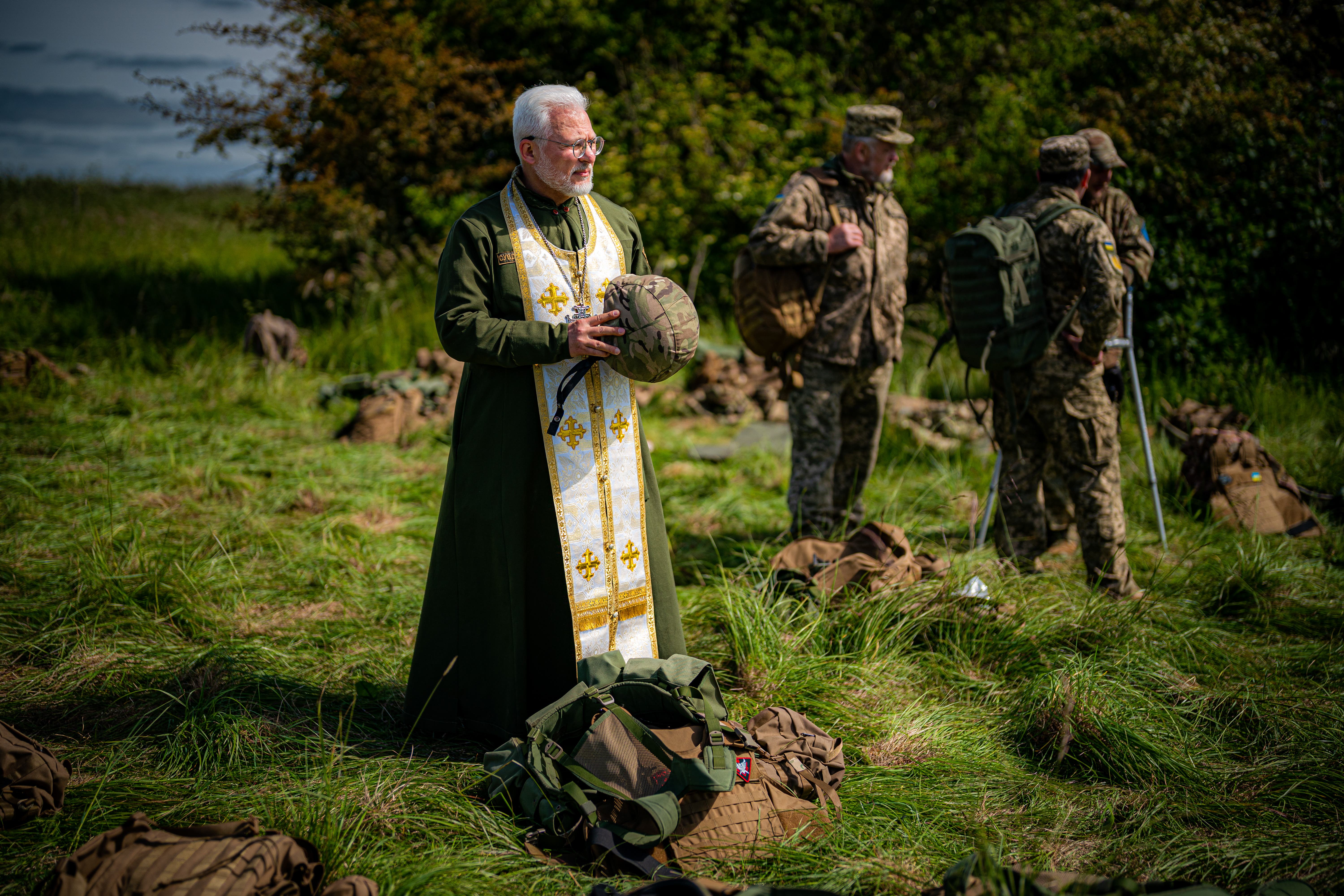Ukrainian military chaplains complete training with British Army
The participants learned how to deliver pastoral care, spiritual support and moral guidance to soldiers on the battlefield.

Your support helps us to tell the story
From reproductive rights to climate change to Big Tech, The Independent is on the ground when the story is developing. Whether it's investigating the financials of Elon Musk's pro-Trump PAC or producing our latest documentary, 'The A Word', which shines a light on the American women fighting for reproductive rights, we know how important it is to parse out the facts from the messaging.
At such a critical moment in US history, we need reporters on the ground. Your donation allows us to keep sending journalists to speak to both sides of the story.
The Independent is trusted by Americans across the entire political spectrum. And unlike many other quality news outlets, we choose not to lock Americans out of our reporting and analysis with paywalls. We believe quality journalism should be available to everyone, paid for by those who can afford it.
Your support makes all the difference.Ukrainian military chaplains have completed training with the British Army before heading back to the war-ravaged country to give frontline troops a “spiritual umbrella”.
The two-week programme run by the Royal Army Chaplains’ Department (RAChD) saw an initial group of 10 Ukrainians train at a camp in south-west England.
The participants learned how to deliver pastoral care, spiritual support and moral guidance to soldiers on the battlefield.
Lieutenant Dmytro Povorotnyi, a priest from Dnipro in central Ukraine, was one of the officers who took part.
“Once when Russia bombed Dnipro, my granddaughter who is four years old put her toys under the stairs and covered them with an umbrella,” said Lt Povorotnyi, who decided to become a military chaplain after the occupation of Crimea in 2014.
“We have the understanding that the umbrella that covers Ukraine, it’s our armed forces. Our men and women are so strong because they protect Ukraine from the enemies that are so cruel, that came to Ukraine to kill and rape a lot of people.
“But even those men and women who are fighting, they also need some protection.
“The main aim of chaplaincy is to give a spiritual umbrella to the personnel who are fighting for us. It’s not just about the weapons and rockets, it’s about spiritual support.”
Lieutenant Taras Kotsyuba, who has also been a military chaplain since 2014, explained why religion is so important to Ukrainian soldiers on the front lines.
“There is a saying that there is no atheism in war,” he said.
“The main aim of chaplaincy, it’s not to make a person come back to God, it’s to help them find a way to God.
“It’s true that I’m a priest and can’t carry a weapon, but I can be with the soldiers who couldn’t accept the idea of Russian occupation and decided that they had to be a part of that war.”
Like Lt Povorotnyi, Lt Kotsyuba has left his family to support Ukrainian soldiers in the war against Russia.
The soldiers are more open with the chaplains than their commanders
His wife and their children remain in their hometown near Lviv in the west of the country.
“I wanted to do something for their future,” he said.
Ukraine’s army already has 160 chaplains who have joined the military’s command structure from April 2023, having previously worked as embedded civilians rather than officers.
Many more are needed though to give proper support to soldiers facing the horrors of war, said Colonel Vitalii Skrybets, head of the Military Chaplaincy Service of the Armed Forces of Ukraine.
“We need more than 700 chaplains, at the moment we have more than 100 chaplains in position but it’s still not enough,” he said.
“It’s important to have a good quality of training,” he added.
“Chaplains are from different departments like the navy, the infantry, special forces and medical department as well.
“They have passed six weeks training in Ukraine and now just want to improve their skills here.
“If you have situations where you don’t see any chance and options, chaplains give hope to move on,” Col Skrybets said.
“The soldiers are more open with the chaplains than their commanders.”
Military chaplains come from a wide range of faith backgrounds and perform duties such as supporting bereaved soldiers and families, leading religious services and providing confidential counselling.
Chaplains have long been vitally important in the support offered to British soldiers, serving as professionally qualified officers wherever personnel are sent.
The RAChD was awarded its royal prefix by King George V after the First World War but had existed for more than 100 years, having been established in 1796.
Reverend Robin Richardson, a chaplain in the RAChD who helped design and deliver the training to the Ukrainian visitors, said that he hopes the course can be delivered to more chaplains.
“These chaplains who we have on the course at the moment are the leading edge of the chaplains’ department they’ve been developing over the last two years,” he told the PA news agency.
“They want to be providing spiritual support to people of all beliefs. When people have ‘first order’ questions – why am I here, what is my purpose, what’s going on, what’s beyond the horizon, how can I have hope – they’re there to offer spiritual support to people of all beliefs, but they also offer pastoral support.”
With help from military chaplains, soldiers’ morale is high, said Col Skrybets.
He added that he is “358%” confident that Ukraine’s long-awaited counteroffensive against Russia will go well.
“Counter-attack isn’t something that happens suddenly, they need to work on that,” he said.
“Personnel have a high morale because they understand what they are fighting for, they are fighting for their land.
“This is why we need the chaplaincy in the army to support our soldiers.”